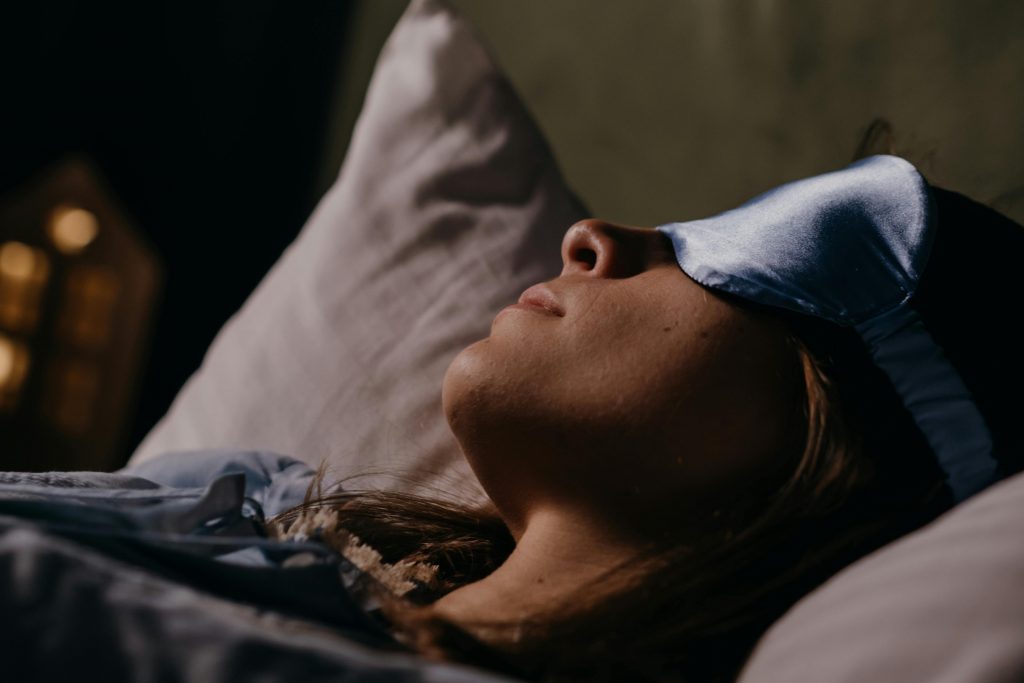The clocks are going to change in just over a week, which means many of us are already instinctively sensing the shift to darker evenings and much cooler days. But this change in season can also disrupt our sleep more than we might expect. And if you add in the hormonal rollercoaster of perimenopause or menopause, then you have a perfect storm for disturbed rest and insomnia, which can have a detrimental affect on your overall health and wellbeing, because it can mess up your circadian rhythm, hormone signals and sleep. That’s why I want to share with you four evidence‑based tips that will help you sleep better this autumn — and into the new year — so you can nip it in the bud before sleepless nights become a challenge!
Our internal body clock — also known as the circadian rhythm — is heavily regulated by exposure to sunlight. But as the daylight hours shorten in the autumn, especially when British Summer Time ends, the timing of our melatonin hormone release shifts earlier. And if we don’t adjust our habits, then our brains can get confused about when it is time to ‘wind down’ from the day. In fact, as mentioned in a BBC article from 2023, researchers have argued that many people who stick to a fixed summer-derived schedule end up “missing out” on up to two hours of sleep as the nights get longer. One of the reasons why is because as ambient temperature cools, our bodies, in principle, can shed heat more easily at night — which is good for sleep. However, sometimes the ambient transitions are abrupt — for example, a warm day and chilly night — and heating systems, bedding changes or hot flushes/night sweats can throw this off. These sudden changes in daylight, temperature and humidity can act like mini jetlag, because it confuses the body’s regulatory systems.
But here’s the thing: sleep is critical for virtually every physiological system in your body. And when your sleep is chronically disrupted, the consequences are wide-ranging — especially for women who are already experiencing perimenopause or menopause, which can magnify the risks, which include:
- Cardiovascular disease and metabolic risk — Chronic insufficient sleep is associated with higher risks of hypertension, atherosclerosis, obesity, type 2 diabetes and metabolic syndrome;
- Immune dysfunction and inflammation — People who habitually sleep fewer than six hours a night experience higher rates of infection and elevated inflammatory markers;
- Mood, cognition and mental health — Sleep disruption is a known risk factor for depression, anxiety, impaired memory and cognitive decline;
- Hormonal dysregulation and weight gain — Sleep deprivation adversely affects cortisol levels (stress hormone), insulin sensitivity and appetite-regulating hormones (leptin/ghrelin), which can worsen any weight gain;
- Bone and reproductive health — Suboptimal sleep can may worsen the turnover of bone cells, imbalance your sex hormones and aggravate menopausal symptoms even more.
In addition, during the peri/menopause transition, the declining and fluctuation of oestrogen and progesterone levels can directly affect your sleep quality, hot flushes, night sweats, restless body sensations and other vasomotor disturbances that cause your body to be less able to regulate your temperature, which can interrupt deeper sleep further. And if you already contend with other daily stresses like caregiving, work pressures, mood swings and underlying chronic disease risk factors, these can also compound the toll of poor sleep.
Better Sleep Habits
Luckily, I have four practical habits that you can do immediately that will help to protect your sleep — especially transitioning into autumn and during the menopause years.
1. Cue Your (Circadian) Clock
You should aim to get AT LEAST 20 minutes of natural light exposure soon after you wake up — and ideally outdoors. This is because the morning light suppresses melatonin and strengthens your wake signal, so it helps to reset your internal clock, which is especially needed during the darker months. If the autumn mornings are too dim or grey, though — which, let’s face it, is a big problem here in the UK — then consider using a SAD light therapy box to wake up in the morning. SAD lights are therapy devices that can be used to treat Seasonal Affective Disorder. They work by mimicking daylight intensity and are especially valuable as the natural daylight shortens in the coming months. You can buy good ones from about £25 on Amazon.
Being consistent, waking at the same time — and if possible, doing a light walk or stretching in natural light — will help to anchor your body’s circadian rhythm amid the seasonal change.
2. Reduce Screen Time
I know you’ve heard me talk about this before, but I can’t stress how important it is to limit your time using screens, because they emit blue light (short-wavelength) that strongly suppresses melatonin production and shifts your circadian timing detrimentally. This is why you should set an ‘electronic sundown’, which should ideally be at least 90 minutes before you turn the lights out. This means switching off your phone, tablet, computer — and TV! Use dim, warm lighting in your bedroom instead, such as candles or red-tinted bulbs. If that sounds too drastic to start, then you could also start using blue‑light glasses or ‘night mode’ filters like Flux — which you can download onto your computer or tablet to take away the blue tinge — although the most reliable route is to simply turn all of your devices off.
This habit will become even more critical in the autumn and winter months, when your brain is already receiving conflicting light cues.
3. The 3-Hour Rule
Digestive activity and your metabolic heat signature can interfere with your body’s ability to cool itself down for better sleep. By having your last meal at least three hours before you go to bed, you’ll be giving your digestive system time to wind down (which will also reduce any risk of reflux, bloating or blood sugar spikes that can interfere with your sleep).
Focus on lighter, nutrient-dense evening meals that contain lean protein, vegetables and healthy fats, and avoid heavy, spicy or refined carbs close to bedtime.
4. Create a Sanctuary
Stability is one of the best gifts you can give your circadian system and by going to bed and waking within a 30-minute window each day (yes, even weekends), you’ll keep a regular rhythm that will help your body anticipate rest, as well as anchor your hormone and core temperature cycles. Plus, when you optimise your bedroom environment, you’ll create a framework that will protect your sleep during any seasonal shifts — and beyond!
Aim for a room temperature of between 16-19°C, which may sound chilly, but cooler rooms help to facilitate the natural drop in core body temperature that’s needed for deeper sleep. You should also invest in some blackout curtains or a weighted eye mask to block any LED streetlights and use earplugs if you live in a noisy environment. Your bedding is also a vital component to avoid overheating — using cotton sheets and duvet covers (polyester bedding encourages AND traps sweat) makes layers more breathable, so they won’t generate too much heat.
When used together, these four tips will create a supportive framework that will protect your sleep through seasonal shifts and any hormonal challenges. And if you need a bit more help to calm your nervous system down even further, you could try taking Nature’s Sunshine Nutri-Calm. This calming formula contains thiamine, niacin, biotin and pantothenic acid, which all contribute to the normal function of the nervous system, as well as chamomile, which has a long history of being used for its calming properties that allow the body to rest better and will support your wind-down window.
CLICK HERE TO FIND OUT MORE ABOUT NATURE’S SUNSHINE NUTRI-CALM
Your sleep is not a trivial matter — especially if your hormones are already shifting, which will amplify your vulnerability to sleep disturbances. And the transition from summer to autumn challenges our internal clock because of the increasing lack of sunlight and drop in temperature, which can also increase the risk of insomnia or poor sleep. Plus, over time, not getting enough sleep will elevate your risk of manifesting cardiovascular disease, metabolic imbalances, mood disorders and immune system dysfunction.
But by embracing the four foundational habits mentioned here (and using Nutri-Calm if you need a bit more help), then you’ll be better equipped to create a strong scaffolding for restorative sleep every night. If you try these shifts and still struggle with chronic insomnia or severe night waking, then there are other lifestyle factors you can look at, such as what you are drinking and eating — and I am, of course, happy to help with this. However, if you’re still having sleep issues, then I strongly suggest that you seek support from a sleep specialist, your GP or a practitioner skilled in women’s health. And you can always call / text me on 07748 298728 or pop me a message by CLICKING HERE. Sleep tight!
Love, Gaynor x





